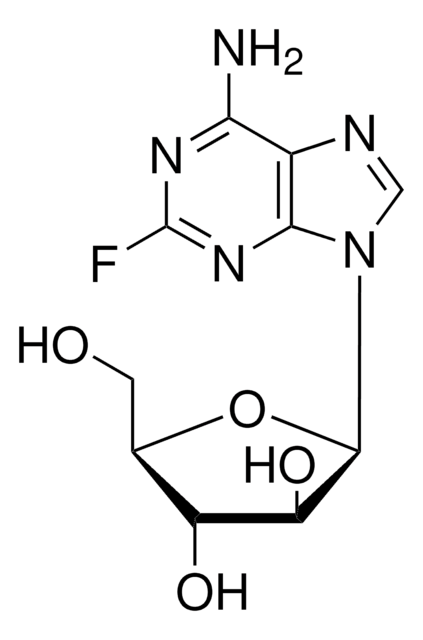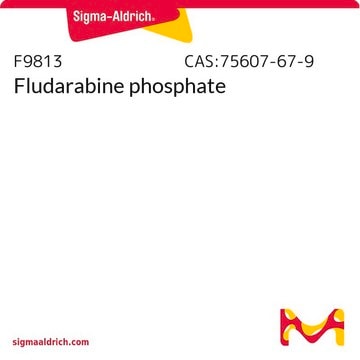C4438
2-Chloro-2′-deoxyadenosine
antileukemic
Synonym(s):
CdA, Cladribine
About This Item
Recommended Products
Quality Level
Assay
≥98% (HPLC)
form
powder or crystals
storage temp.
2-8°C
SMILES string
Nc1nc(Cl)nc2n(cnc12)[C@H]3C[C@H](O)[C@@H](CO)O3
InChI
1S/C10H12ClN5O3/c11-10-14-8(12)7-9(15-10)16(3-13-7)6-1-4(18)5(2-17)19-6/h3-6,17-18H,1-2H2,(H2,12,14,15)/t4-,5+,6+/m0/s1
InChI key
PTOAARAWEBMLNO-KVQBGUIXSA-N
Gene Information
human ... NP(4860)
rat ... Adora1(29290) , Adora2a(25369) , Adora3(25370)
Looking for similar products? Visit Product Comparison Guide
Application
Cladribiane, like fludarabine, is a prodrug that is must be phosphorylated intracellularly to the monophosphate by the nuclear/cytosol enzyme deoxycytidine kinase (dCK) and possibly by the mitochondrial enzyme deoxyguanosine kinase (dGK).
Biochem/physiol Actions
Signal Word
Danger
Hazard Statements
Precautionary Statements
Hazard Classifications
Acute Tox. 3 Oral - Muta. 2 - Repr. 2 - STOT RE 1
Storage Class Code
6.1C - Combustible acute toxic Cat.3 / toxic compounds or compounds which causing chronic effects
WGK
WGK 3
Flash Point(F)
Not applicable
Flash Point(C)
Not applicable
Personal Protective Equipment
Certificates of Analysis (COA)
Search for Certificates of Analysis (COA) by entering the products Lot/Batch Number. Lot and Batch Numbers can be found on a product’s label following the words ‘Lot’ or ‘Batch’.
Already Own This Product?
Find documentation for the products that you have recently purchased in the Document Library.
Customers Also Viewed
Our team of scientists has experience in all areas of research including Life Science, Material Science, Chemical Synthesis, Chromatography, Analytical and many others.
Contact Technical Service











